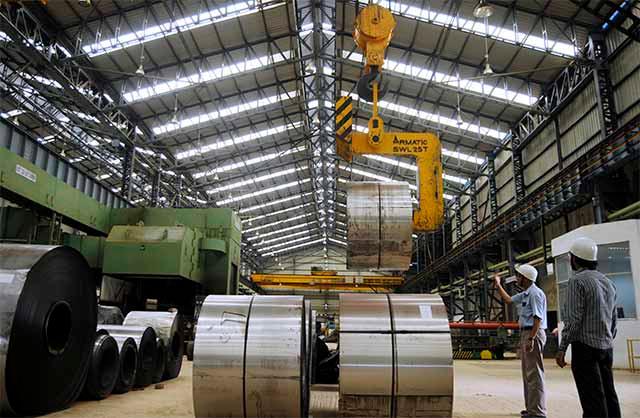Steel has lost its mojo, in turn making everyone including governments uncomfortable. British Prime Minister David Cameron is not ignoring the steel crisis, neither is the Indian government. While Cameron is desperately looking for investors to take over Tata Steel’s UK operations up for sale, the Narendra Modi-led Indian government is devising a bailout package for the beleaguered domestic steel industry.
Why is everyone scrambling to save loss-making steel units? The primary reason, at least in India, is the losses that the banking system will endure due to its high exposure to the steel sector.
The Reserve Bank of India’s bi-annual financial stability report released in December 2015 highlighted that a macro stress test for sectoral credit risk showed that iron and steel industry’s gross non-performing assets ratio may increase from 8.4% in September 2015 to 11.5% by March 2017.
However, there is another aspect as well. As an industry, steel has strong linkages, including socioeconomic, as it helps create jobs not only within but also for upstream and downstream sectors such as mining, logistics and automobiles.
The global steel industry is under stress due to a slowdown in countries consuming steel and significant overcapacity in China. This has resulted in production of steel going down and increase in steel imports in India, thus affecting jobs as well.
In the UK, the Conservative Party-led government is fighting to avert 40,000 job losses—15,000 at Tata Steel and another 25,000 in the supply chain—in case the Tata Steel plants are shut.
“Steel as a sector has very high economic linkages, both upstream and downstream, and is a large employer directly and affects a much larger population indirectly,†said Anjani Agrawal, partner and national leader-metals and mining, EY India, a consultancy.
One of the most important electoral planks of the National Democratic Alliance government which came to power in May 2014 was job creation. With initiatives such as Make in India and Skill India aimed at creating employment opportunities, the manufacturing sector has to play a key role. By 2025, the government wants manufacturing to contribute 25% of the country’s gross domestic product (GDP) from the current levels of 16%.
The Bharatiya Janata Party-led government is projecting a GDP growth of 7-7.75 per cent for the current financial year in the backdrop of nine states, including West Bengal, Punjab, Tamil Nadu and Uttar Pradesh, going for elections by 2017. With job creation being sizeable part of the political narrative, it doesn’t want to be tripped in its electoral quest.
“The government has to show evidence by 2017. In the surveys we conduct across states, the top two concerns of the people are inflation and unemployment,†said N. Bhaskara Rao, a Delhi-based political analyst.
The Consumer Price Index-based inflation for February was at 5.18% compared with 5.69% a month earlier.
Many Indian steel companies, including state-run Steel Authority of India Ltd and Rashtriya Ispat Nigam Ltd, which provided employment to many during their expansion spree, are now feeling the heat.
A top executive at a private steel company, requesting anonymity, said that the domestic steel companies have resorted to capacity cuts and it has led to job losses, both directly and indirectly.
“That is why, any support package from the government for the steel industry must be seen not only from a financial perspective but also from the socioeconomic angle,†added Agrawal.
India’s ministry of steel has tasked consultancy firm KPMG and merchant banker SBI Capital Markets Ltd to devise a bailout package for the domestic steel industry.
However, India’s Economic Survey 2016 stated that any future safeguards for the steel industry may not be in the best interest of the downstream industries. Also, India’s commerce and industry minister Nirmala Sitharaman on 4 April said that her ministry was not in favour of additional steps to check cheap steel imports, news agency Press Trust of India reported.
Analysts on their part believe that some kind of protection holds importance for the steel industry at this juncture.
“With input prices going down, prices of end products have also gone down drastically as a result of which all steel manufacturers have been impacted and have resorted to capacity cuts,†said Bijoy Thomas, analyst at India Ratings and Research Pvt. Ltd. He added that the government’s interventions since the stress began in early 2015 lacked efficacy.
Rao believes that as more people are getting educated, there is a need for larger job creation and the government cannot afford job losses as it needs to cater to this segment of the society.
Note: This story has been republished with corrected data.






